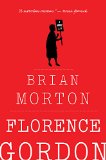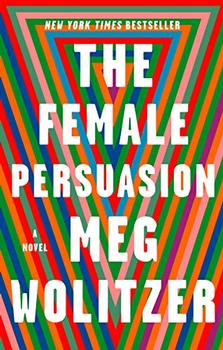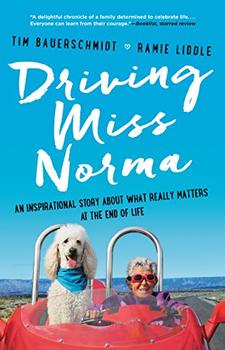Summary | Excerpt | Reading Guide | Discuss | Reviews | Beyond the book | Read-Alikes | Genres & Themes | Author Bio

The protagonist in Brian Morton's novel, Florence Gordon, is a 75-year-old feminist writer described in various parts of the book as "imperious," "acerbic," and "a complete pain in the neck." Yet at a surprise party in her honor (not for her birthday, she's told, but just so she can have some fun), one of her closest friends announces to Florence and the gathered crowd that she is "a gloriously difficult woman."
Indeed she is. From the beginning to end of this book, Florence is a woman utterly devoid of apology for her candor (which can be brutal) and her convictions (which can be admirable). More often than not, she's a force to be reckoned with, and the scenes that play out are frequently brash but insightful and, at times, surprisingly tender.
Morton is the author of four previous novels, including Starting Out in the Evening and A Window Across the River. Like these books, Morton's most recent offering is also set in New York City and explores some of his familiar themes—notably aging, the writing life, generational divisions, family, and friendship. Leonard, the 71-year-old writer in Starting Out in the Evening (perhaps Morton's most widely known work that was made into a movie in 2007), is compelling due in large part to his vulnerability, his reserve, and his quiet fortitude. Florence, however, is compulsively readable for her audacity and cantankerousness, resulting in a novel that is Morton's funniest and arguably his boldest work yet.
The novel takes place during Obama's first year in office. In the first few chapters, we learn that Florence was part of the women's movement in the 1970s (see 'Beyond the Book'). She's the author of six respected books and a recent medal recipient awarded by the American Academy of Arts and Letters. She doesn't dye her hair, she has no interest in Botox, and she doesn't whiten her teeth. Morton writes, "She wasn't a woman who wanted to recapture her youth. In part this was because she found the life she was living now so interesting."
At work on her memoir, there's nothing that Florence wants more than solitude, time to "remember the texture of the past" so she can finish her seventh book. Inevitably, other aspects of her life—namely her family—intrude upon her plans.
For starters, there's her psychologist daughter-in-law, Janine, whose research fellowship has brought her temporarily from her home in Seattle to New York City. Janine has always had an "intellectual crush" on her mother-in-law, one that has hardly gone unnoticed by the impatient Florence, who is endlessly irritated by what she perceives to be inane or worshipful questions about her work and life: whether she writes on a computer or typewriter, for example. And whether she ever had an affair with Norman Mailer because all feminists from Florence's generation, Janine thinks, had secret affairs with him. After 23 years, Florence thinks, "Why did my son have to marry such a suck-up?"
It doesn't take long for Florence's son, Daniel—a cop by profession—to enter the picture. As it turns out, he has unused and ample vacation time, making it possible for him to join Janine and their 19-year-old daughter, Emily. There's also Florence's ex-husband, Saul, who expects her to recommend him as a lecturer at NYU even though he hasn't had a steady teaching job in years.
Adding to her list of distractions is a surprising—and glowing—article in The New York Times Book Review, in which she's declared a "national treasure" for her previously published work. The acclaim sparks attention on a grand scale, including her first book tour, which, at first, Florence finds "lavish." She enjoys talking to women who had never been part of a social movement, "women for whom the word 'organizing' probably refers to nothing more radical than redoing their closets." Soon, however, Florence starts to complain that success is preventing her from concentrating on her work. "I need a wife," she says. Instead of a spouse she gets an assistant, her granddaughter who steadily learns that Florence is much more than just "an old windbag."
As usual, Morton delves deeply into all his characters with equal wit, razor-sharp observations, and compassion. But most important, Florence Gordon is a joy to read for its beautiful and complex depiction of an intelligent, uncompromising woman who defiantly—or courageously—remains steadfast in living a life of her own determination.
![]() This review was originally published in The BookBrowse Review in October 2014, and has been updated for the
September 2015 edition.
Click here to go to this issue.
This review was originally published in The BookBrowse Review in October 2014, and has been updated for the
September 2015 edition.
Click here to go to this issue.

If you liked Florence Gordon, try these:

by Meg Wolitzer
Published 2019
An electric, multilayered novel about ambition, power, friendship, and mentorship, and the romantic ideals we all follow deep into adulthood, not just about who we want to be with, but who we want to be

by Tim Bauerschmidt, Ramie Liddle
Published 2018
Infused with this irrepressible nonagenarian's wisdom, courage, and generous spirit, and filled with sixteen pages of color photographs, Driving Miss Norma reminds us that life is beautiful and precious, and that family, fun, and self-discovery can happen at any age.
Your guide toexceptional books
BookBrowse seeks out and recommends the best in contemporary fiction and nonfiction—books that not only engage and entertain but also deepen our understanding of ourselves and the world around us.